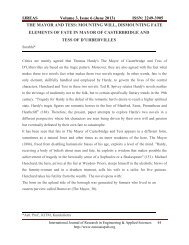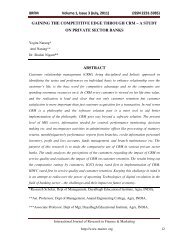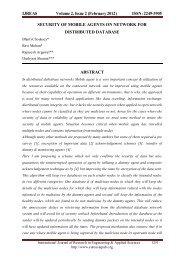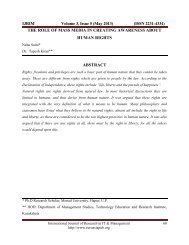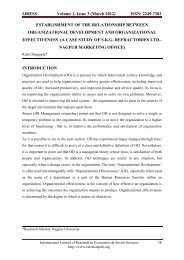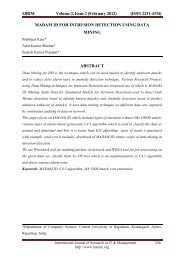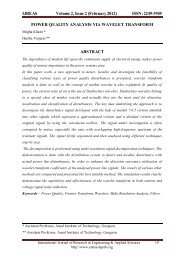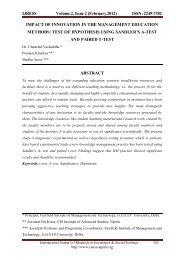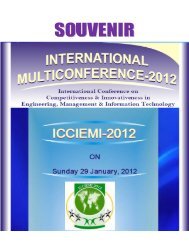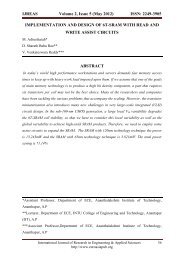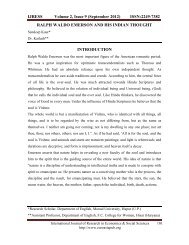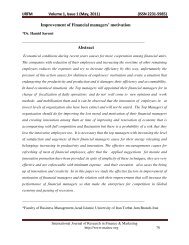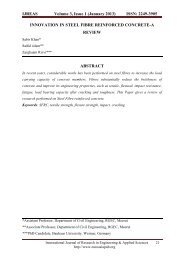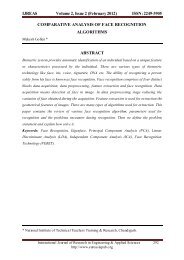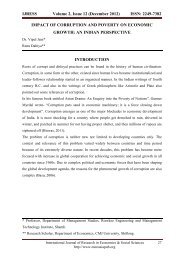A RELATIONSHIP BETWEEN ORGANISATIONAL ... - Euroasiapub.org
A RELATIONSHIP BETWEEN ORGANISATIONAL ... - Euroasiapub.org
A RELATIONSHIP BETWEEN ORGANISATIONAL ... - Euroasiapub.org
You also want an ePaper? Increase the reach of your titles
YUMPU automatically turns print PDFs into web optimized ePapers that Google loves.
IJRFM Volume 1, Issue 2 (June, 2011) (ISSN 2231-5985)<br />
The present study aims at identifying significant dimensions of responsive work culture<br />
conducive to achieving global standards of performance specifying contributions of<br />
management and workers to that end and examining their implications for Industrial<br />
Relations and practices in Indian <strong>org</strong>anizations.<br />
INDUSTRIAL RELATIONS ENVIRONMENT AND WORK CULTURE<br />
It is evident that without a work culture of excellence the <strong>org</strong>anizations in India will not be<br />
able to develop, healthy Industrial Relations a pre-requisite to providing competitive edge in<br />
global market place. There is inevitably interactive relationship between Industrial Relations<br />
and Work Culture.<br />
The structural adjustment policy adopted by India and its struggle to gain competitive edge<br />
in the global economic order envisages a strong commitment and change in the outlook<br />
thinking and attitude of its people. Attitude change presupposes change in work culture. It<br />
has been increasingly realized that human resource is the most important resource for any<br />
economy to thrive and prosper. India fortunately has skilled and competent manpower and<br />
the cost of manpower is low as compared to many other industrially developed countries.<br />
Responsive work culture is reflected in continuous improvement in productivity, quality,<br />
innovation and growth; legitimate areas of concern for both management and labour. In India<br />
work has been accorded a secret place in the scriptures. However, over the years there has<br />
been an erosion of the values and it is often argued that Indian worker today lacks a positive<br />
work culture. The worker more often is blamed for this (Sodhi, 1998). The workers, on the<br />
other hand, blame the management for its high-handedness, on healthy practices and hostile<br />
attitude towards labour. Attitudinal change is thus imperative to enable <strong>org</strong>anizations to adapt<br />
to the competitive environment, which can come about only gradually through sustain cooperation<br />
and concerted efforts among the three social partners-the Government, the<br />
employers and the employees.<br />
Every <strong>org</strong>anization develops a culture unique to its own, which can be termed as<br />
<strong>org</strong>anizational ideology-patterns of beliefs, values, norms, rituals, myths and sentiments<br />
shared by the members of <strong>org</strong>anization. The ideology, which is implicit in the minds of<br />
employees, influences and governs the response patterns of individuals and groups within the<br />
<strong>org</strong>anization. It thus regulates the energy exchange between the <strong>org</strong>anization and its members<br />
and impacts most aspects of <strong>org</strong>anizational life, such as how decisions are made, who makes<br />
International Journal of Research in Finance & Marketing 55<br />
http://www.mairec <strong>org</strong>



